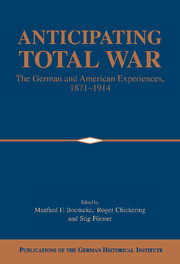Book contents
- Frontmatter
- Introduction
- Part One Germany, The United States, and Total War
- Part Two War and Society
- Part Three Memory and Anticipation: War and Culture
- 11 The American Debate over Modern War, 1871-1914
- 12 Whose War? Whose Nation?: Tensions in the Memory of the Franco-German War of 1870-1871
- 13 War Preparations and National Identity in Imperial Germany
- 14 Military Imagination in the United States, 1815-1917
- 15 Dreams and Nightmares: German Military Leadership and the Images of Future Warfare, 1871-1914
- 16 “A Calamity to Civilization”: Theodore Roosevelt and the Danger of War in Europe
- Part Four The Experience of War
- Index
16 - “A Calamity to Civilization”: Theodore Roosevelt and the Danger of War in Europe
Published online by Cambridge University Press: 05 January 2013
- Frontmatter
- Introduction
- Part One Germany, The United States, and Total War
- Part Two War and Society
- Part Three Memory and Anticipation: War and Culture
- 11 The American Debate over Modern War, 1871-1914
- 12 Whose War? Whose Nation?: Tensions in the Memory of the Franco-German War of 1870-1871
- 13 War Preparations and National Identity in Imperial Germany
- 14 Military Imagination in the United States, 1815-1917
- 15 Dreams and Nightmares: German Military Leadership and the Images of Future Warfare, 1871-1914
- 16 “A Calamity to Civilization”: Theodore Roosevelt and the Danger of War in Europe
- Part Four The Experience of War
- Index
Summary
At first glance, Theodore Roosevelt's attitude toward war and his approach to foreign policy seem to have been contradictory. He was the most prominent militarist in American history, but during his presidency he kept the United States out of war. He was a firm believer in military virtues, yet he earned the Nobel Peace Prize for his efforts in ending the Russo-Japanese War. He was a brilliant politician, but still he got himself involved in European power politics although doing so could only have harmed his domestic political position.
The historiography on Roosevelt's foreign-policy thinking offers two different answers to the puzzle: The currently predominant school of thought projects him as a strong, heroic figure who was motivated by altruistic and moralistic goals. Scholars who hold to this view celebrate Roosevelt as an omnipresent and omniscient genius of diplomacy who singlehandedly forced the Kaiser into submission and became the peacemaker of Europe. Other scholars prefer to view his diplomacy in the context of economic imperialism and dismiss his jingoism as mere rhetoric. For them, Roosevelt is a skillful and pragmatic strategist who competed with the European powers for new markets.
- Type
- Chapter
- Information
- Anticipating Total WarThe German and American Experiences, 1871–1914, pp. 377 - 396Publisher: Cambridge University PressPrint publication year: 1999



